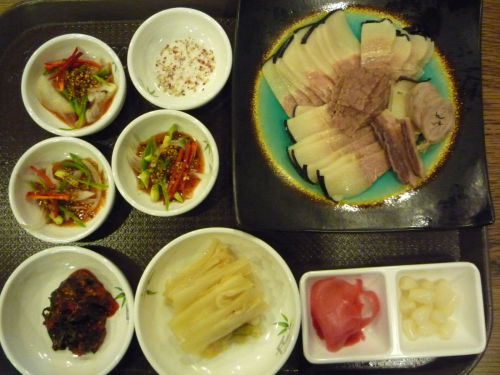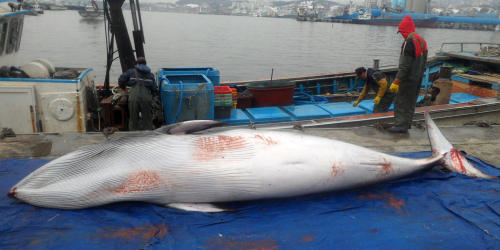Park, 56, who did not wish to give his first name, recently opened a whale meat restaurant in a popular drinking area near Haeundae beach in Busan.
“Whale meat is becoming increasingly popular here with many new restaurants constantly being opened,” he said.
“We only open after late afternoons. Whale meat is commonly eaten as a side dish with a glass of soju or sake. Minke whale is the most popular,” Park added.
Park explained that most of his customers are whale meat fans who have been enjoying the dish for a long time.
“Sometimes, we even have Japanese customers. In Japan whale meat is extremely popular. However, there are not many newcomers when it comes to whale meat,” he said.
Jung Jung-mo is one of Park’s regular customers.
“I have been enjoying whale meat for the past 20 years. At first I didn’t like the taste of it. But after trying it several times it became one of my favorite dishes. It is best served with a glass of soju,” Jung said.
And for some, the meat is an important part of family tradition.
Moon Ji-sook, 50, has been eating it since childhood.
“My parents liked it, so I naturally followed their taste. I think it is tasty,” Moon said.
The meat can be served sautéed, stewed or sliced up as sashimi.
However, it is illegal to hunt whales. In 1982, the International Whaling Commission approved a ban on commercial whaling which went into effect in 1986.
“Whale meat is legal as long as it is accidentally caught in nets during other fishing operations. Many restaurants here need to follow that law,” Park explained.
All whales caught accidentally in fishing nets or washed ashore are required to receive an official certificate before being sold in state-designated facilities.
According to the Korea Coast Guard, from 2007 until 2009, 1,980 whales were found dead in nets or washed ashore.
The average number of whales accidentally trapped in nets each year is 660, twice higher than of 2000, with an average of 300 dead whales.
Whales are expensive with one whole Minke whale costing approximately 20 million won ($17,940).
Lately, the incidence of accidental fishing of whales has surged. According to the Korea Coast Guard in Pohang, in 2008, four whales were killed while in 2010 more than 26 whales were illegally captured.
Under the current law, if one is caught illegally whaling, they will be sentenced up to three years in jail or must pay a 30 million won fine.
“There has been a steady increase in the whale population in waters near the Korean Peninsula, which has raised the chance of fishermen intentionally hunting these animals for easy profit,” an official for the Ministry for Food, Agriculture, Forestry and Fisheries said.
On the contrary, many fishermen believe that commercial whaling should be legalized.
“The numbers of fish are decreasing, because one dolphin eats about five to 10 kg of herring and squids. The number of fish caught is significantly decreasing,” said the Pohang Fisheries Association.
The Korean Federation for Environmental Movement works with international organizations, investigates and reports the illegal hunting of whales.
“Whales are endangered giant mammals that should be protected,” said the Ocean Committee of the KFEM.
The price of whale meat in a restaurant can range from 20,000 won to more than 100,000 won, depending on the quality and quantity of the meat.
By Moon Ye-bin (
yebinm@heraldcorp.com)
Intern reporter










![[Today’s K-pop] Blackpink’s Jennie, Lisa invited to Coachella as solo acts](http://res.heraldm.com/phpwas/restmb_idxmake.php?idx=644&simg=/content/image/2024/11/21/20241121050099_0.jpg)